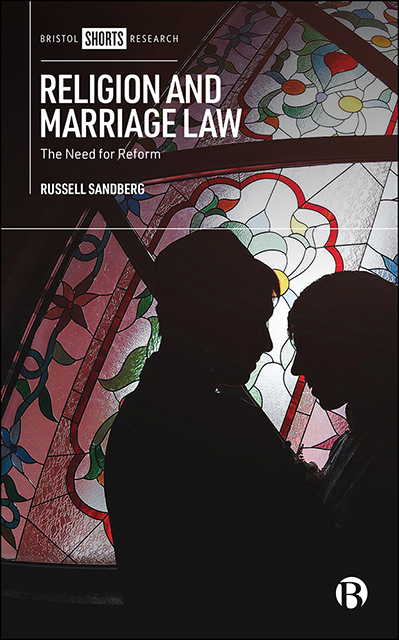Four - Unregistered Religious Marriages
Published online by Cambridge University Press: 18 April 2023
Summary
Introduction
This chapter explores the debate on unregistered religious marriages. It will fall into three sections. The first part will outline how the unregistered religious marriage issue has arisen in public debate, looking at the empirical studies that highlighted the issue and the numerous reviews that have taken place which have highlighted it as a problem and sought to solve it. The second part will then examine and critique a particular reform proposal that has come to the fore: a new criminal offence penalising celebrants. The chapter will conclude with discussion of a highprofile case – the Family Court and Court of Appeal decisions in Akhter v Khan – which highlighted the problem of unregistered religious marriages and the lack of legal relief for those in such marriages and the need for legislative rather than judicial reform.
The fear of Sharia
While public debate about the accommodation of minority religious cultures is long standing, the current impetus for reform can be dated back to a lecture by the then Archbishop of Canterbury, Rowan Williams, at the Royal Courts of Justice in 2008. Williams’ lecture was not about marriage law but, rather, about the general accommodation of religious law by State law and, in particular, the operation of religious tribunals. In his lecture, Williams raised the question of ‘what it is like to live under more than one (legal) jurisdiction’ and how (and how far) the civil law of the land should recognise or accommodate a legal pluralism based on religious adherence. He suggested that ‘we have to think a little harder about the role and rule of law in a plural society of overlapping identities’. This caused uproar: a succession of senior figures came out to condemn Williams’ thinking, while the television news graphically illustrated the item with footage of stonings.
However, the heat of the immediate media and political coverage gave way over time to light, thanks to a number of academic studies. The debate came to focus on the role that Sharia law played in the lives of Muslims in England and Wales and what the role of the State should be in ensuring that adherence to the authority of religious groups did not result in discrimination and disadvantage.
- Type
- Chapter
- Information
- Religion and Marriage LawThe Need for Reform, pp. 31 - 48Publisher: Bristol University PressPrint publication year: 2021



